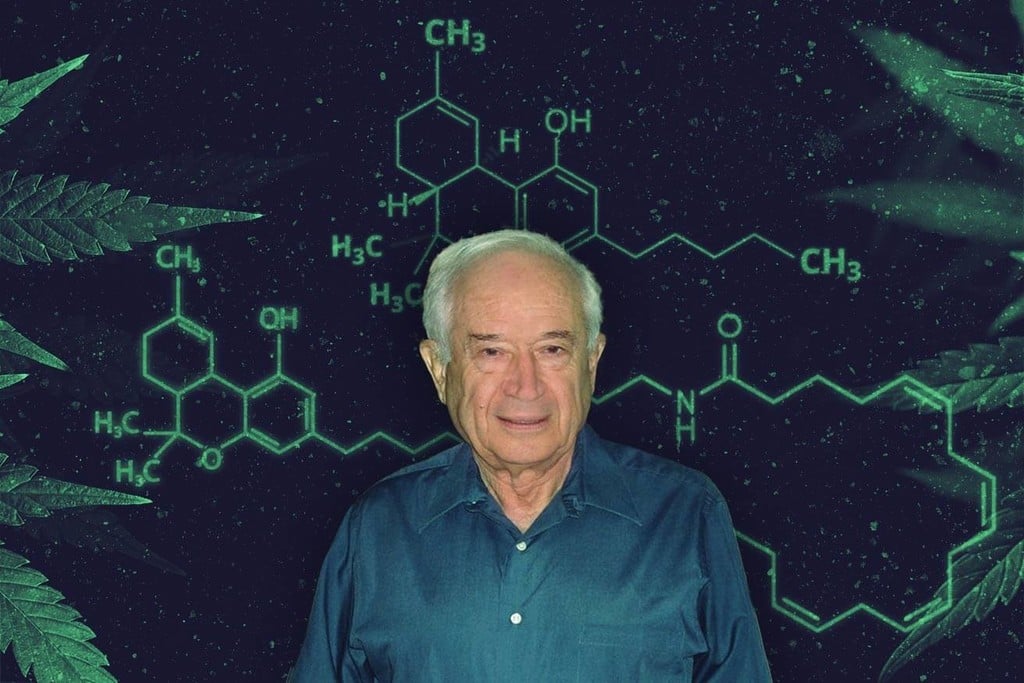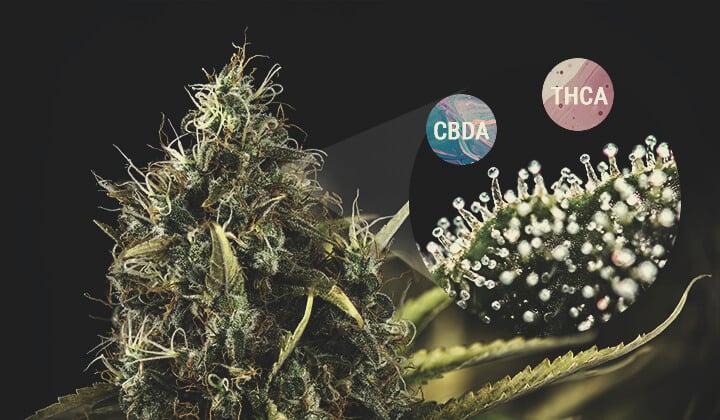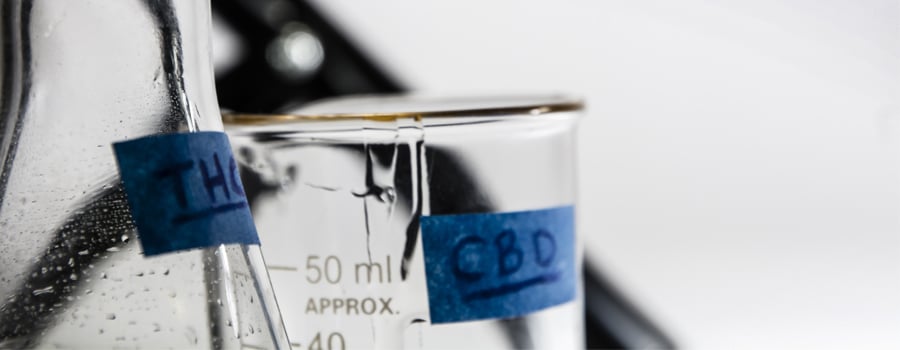.

Dr Mechoulam: A Tribute to the Father of Cannabis Research
No other researcher has contributed as much to the field of cannabis research as Dr Raphael Mechoulam. Known as the "father of cannabis research", Mechoulam discovered THC and helped to identify the key components of the endocannabinoid system. In 2021, he made his latest groundbreaking discovery in the world of cannabinoid acids.
Contents:
Humans have used cannabis for thousands of years. In ancient times, we figured out some of its holistic applications and utilised it as a source of paper, rope, and food. But only in the last century have we really started to unveil some of its deepest secrets.
We owe it to certain chemists, biologists, and other scientific researchers for taking the daring steps to acquire our current understanding of the herb.
There are a few well-known individuals that helped to discover the chemicals within the plant and elucidate how they work in the body. But none of these names receives more praise than Dr Raphael Mechoulam.
Unfortunately, Mechoulam passed away in March 2023 after a lifetime devoted to cannabis research. His six-decade career was marked by perseverance and dedication, resulting in millions of patients benefiting from his work.
Raphael Mechoulam was a founding member of the International Cannabinoid Research Society (ICRS) and a renowned figure in the field of cannabinoids. In a statement released by the society after his passing, Mechoulam was affectionately referred to as "Raphi", demonstrating his approachable and kind personality in addition to his brilliance as a scholar. Mechoulam's engaging public conferences around the world were a testament to his knowledge and passion for cannabis research.
Mechoulam and His Latest Discovery: EPM301
Dr Mechoulam broke a lot of ground during his career. From discovering and isolating THC to unveiling key endocannabinoid system components, modern researchers truly stand on the shoulders of this academic giant. In his latest discovery, he managed to create a cannabinoid acid known as EPM301 that shows great promise as a future pharmaceutical.
In 2020, the year in which he celebrated his 90th birthday, Mechoulam found a way to stabilise previously volatile cannabinoid acids. In certain instances, these compounds exert more potent effects than their "activated" counterparts, but their lack of stability makes them poor candidates for research and application. That was until Mechoulam got his hands on them.
What Are Cannabinoid Acids?
Cannabinoid acids are naturally occurring compounds synthesised within the glandular trichomes of cannabis plants—those shiny little structures that form a glistening “frost” on the surface of buds.
It might surprise you to know that raw cannabis contains very little THC and CBD. Instead, these cannabinoids start out life as cannabinoid acids. For example, CBD (cannabidiol) exists as cannabidiolic acid in raw weed flowers. It possesses a different molecular structure to CBD, in that it features an additional group of hydrogen, oxygen, and carbon atoms, known as a carboxyl group.
When you pack CBD-rich flowers into a bowl and apply a flame, you harness the power of heat to convert CBDA into CBD before inhaling the smoke. Through a process called decarboxylation, the additional carboxyl group ejects from the molecule, creating CBD.

Whenever we smoke, cook, or vape cannabis, we convert all of those cannabinoid acids into their corresponding cannabinoids. But are we missing out when it comes to cannabinoid acids?
Indeed, cannabinoid acids bring their own traits to the table. Because they have different molecular structures, they’re able to influence the body and the endocannabinoid system in a different manner. Ongoing research[1] continues to explore the potential of cannabinoid acids, with a particular focus on their effects on immune response, mood, stomach discomfort, and degenerative diseases.
Despite their unique and promising properties, cannabinoid acids pose a big problem for companies looking to develop them as medicines and supplements. It’s not only heat that decarboxylates them and changes their structure. Long-term storage and UV exposure can agitate a cannabinoid acid and convert it into an activated cannabinoid as well. Well, that was until the father of cannabis research came along and did what he does best: revolutionise cannabis science.


EPM301 & CBDA
Mechoulam worked at various labs and with various teams during this career. Most recently, he spearheaded the medical team for EPM, a pharmaceutical group working to develop novel therapeutics from synthetic cannabinoids.
EPM has turned their research efforts toward cannabinoid acids. Reshef Swisa, the CEO of the company, has stated[2]: “While the entire industry is working on the compounds that decarboxylate from the plant after it starts drying up, we were more interested in looking into what happens on the plant itself”.
Swisa has also highlighted why a lot of pharmaceutical companies aren’t really paying attention to cannabis. He claims that they don’t show much interest because these businesses can’t patent the formula for a natural molecule.
On top of this, he has identified perhaps the biggest challenge when it comes to working with cannabinoid acids: “The cannabis acids are very unstable, meaning they break apart into cannabinoids very easily. If you tried to take them from the plant or tried to consume them, the heat of your body would break them down and they would decarboxylate”.
However, the team at EPM supports the view that cannabinoid acids offer more potent effects than their resulting cannabinoids. To tackle the issues of patentability and volatility, EPM recruited the genius mind of Mechoulam.
During his research role at the company, Mechoulam overcame the hurdle of cannabinoid acid breakdown. He developed a technique that modifies the acids and keeps them stable enough to make them usable on an industrial scale.
Mechoulam took CBDA and stabilised it using a chemical process called esterification. This procedure enables the carboxyl group to maintain a grip on the rest of the CBD molecule, meaning it keeps CBDA intact in situations that would otherwise pull the chemical apart.
Not only did this discovery increase the stability and therefore usefulness of the cannabinoid acid, but it allowed EPM to patent this form of CBDA, which they called cannabidiolic acid methyl ester, or EPM301.
EPM301 and Its Potential Uses
Cannabis researchers are currently exploring the potential of CBDA for a variety of conditions, including neuropathic pain[3] and Dravet syndrome[4].
Mechoulam himself gave a glimpse into the ongoing research[5]: “We compare our compound not only to cannabinoids but to the existing drugs that are applied today”, adding, “So, for example, in IBD [inflammatory bowel disease] we compared our compounds to two conventional products: one is the prednisone (the steroids) and one is a biological drug. And in both of them, we managed to prove that the activity of our compound is very similar to the common one”.
The legendary researcher had an optimistic outlook when it came to his latest creation. He hoped that, within the next few years, it would reach a similar status in the market as CBD.
Swisa has also shared his hopes about the potential future applications of EPM301. In general, the signs look good that this synthetic cannabinoid acid will find its way into clinical settings.

Mechoulam: Who Was the Father of Modern Cannabis Research?
Mechoulam’s discovery has led to a cannabinoid acid revolution. Once again, his genius paved the way toward a future of cannabis-based medicine. Although impressive, this finding barely scratches the surface of this man’s contributions to the world of cannabis science.
Entering the World of Weed
Born in Bulgaria, Mechoulam’s parents took him to Israel in 1949. Here, he earned a master’s degree in biochemistry from the Hebrew University of Jerusalem in 1952, followed by a PhD in chemistry from the Weizmann Institute in Rehovot.
Mechoulam clearly had a penchant for chemicals from the get-go. Eventually, he’d find himself applying this knowledge within the field of cannabis. He recalled the start of his cannabis journey as a fateful bus ride in 1964. After receiving 5kg of hash from the Israeli police, he was tasked with transporting it back to his laboratory at the Weizmann Institute. His team had already discovered the chemical structure of CBD back in 1963, and now they had an entire brick of cannabis chemicals to play with.
Discovery and Synthesis of THC and Other Cannabinoids
It didn’t take long for Mechoulam to work his magic. He successfully isolated THC[6] from this same lump of hash alongside his research partner Yehiel Gaoni. In a paper titled “Isolation, Structure, and Partial Synthesis of an Active Constituent of Hashish”, the two documented the process of obtaining and discovering the psychotropic cannabinoid from the crude material.
Although Mechoulam and Gaoni deserve all the credit for this discovery, it’s important to remember that they were continuing the decades-long work of researchers before them. Such efforts include those of Robert Cahn, who first isolated CBN[7]—a product of THC degradation. One year later, in 1965, the two were also the first to synthesise THC[8] in the form of dl-Δ1-tetrahydrocannabinol. Mechoulam and his team also discovered the chemical structures of other cannabinoids over the next decade, including CBG, CBC, and several cannabinoid acids.

Unveiling the Endocannabinoid System (ECS)
After the discovery of THC, various animal and human studies confirmed that THC was indeed the main psychotropic component of cannabis. However, researchers didn’t know how the cannabinoid managed to produce these effects.
Scientists knew of the lipophilic nature of THC—that cannabinoids readily bind to fat. This knowledge gave way to a theory that the molecule acted non-specifically in the body. Some researchers believed that THC probably entered the high-fat environment of the cell membrane, where it floated around and altered consciousness through a non-specific mechanism of action.
Mechoulam’s work swiftly changed this view. In the 1980s, the father of cannabis research and his colleagues determined that cannabinoids work through a specific mechanism in the body[9]. This finding catalysed the hunt for cannabinoid receptors in mammalian tissue.
Researchers discovered two G-coupled protein receptors that make up what we now know as the canonical endocannabinoid system. They discovered the CB1 receptor (where THC binds to produce its effects) in 1988, and the CB2 receptor in 1993.
The presence of cannabinoid receptors in mammalian tissue then drove attention toward finding the endogenous signalling molecules that bind to them. Mechoulam passed the finish line in the first place, leading a research team that concluded anandamide (the bliss molecule) serves as a CB1 activator, and that 2-AG also works to regulate the endocannabinoid system.
Mechoulam also contributed massively to cannabinoid research by designing and synthesising a range of novel synthetic cannabinoids that are used to target endocannabinoid receptors during research. These include:
- HU-210: A synthetic analogue of THC that targets CB1 and CB2
- HU-308: A molecule designed to target CB2
- HU-580: A synthetic form of CBDA that displays more potency than the natural molecule, and targets serotonin receptors
A Legendary Figure in Cannabis Science
Mechoulam made a name for himself within the field of cannabis science. His discoveries have not only led to a better understanding of the cannabis plant, but a more thorough view of the human body and its systems.
We owe a lot to this hard-working academic. Mechoulam received numerous “Highly Cited Researcher Awards”, and ranks among the top 1% of researchers in the world for cited papers in a specific domain of study.
The scientific publisher BioMed Central interviewed Mechoulam in 2020, asking him about his thoughts on the future of cannabis research[10]. He stated he’d like to see more human clinical trials regarding cancer and further exploration of the expanded endocannabinoid system. Hopefully, the doctor’s wishes will come true in the near future.
- Cannabis Pharmacology: The Usual Suspects and a Few Promising Leads - PubMed https://pubmed.ncbi.nlm.nih.gov
- Father of cannabis research plans a new revolution nearly 60 years later - The Jerusalem Post https://www.jpost.com
- An evaluation of the anti-hyperalgesic effects of cannabidiolic acid-methyl ester in a preclinical model of peripheral neuropathic pain https://bpspubs.onlinelibrary.wiley.com
- Pharmacokinetics of Phytocannabinoid Acids and Anticonvulsant Effect of Cannabidiolic Acid in a Mouse Model of Dravet Syndrome https://pubs.acs.org
- More Potent Than CBD, THC: Dr. Raphael Mechoulam Explains His Latest Discovery https://www.forbes.com
- Isolation, Structure, and Partial Synthesis of an Active Constituent of Hashish https://pubs.acs.org
- 174. Cannabis indica resin. Part III. The constitution of cannabinol - Journal of the Chemical Society (Resumed) (RSC Publishing) https://pubs.rsc.org
- A Total Synthesis of dl-Δ1-Tetrahydrocannabinol, the Active Constituent of Hashish https://pubs.acs.org
- The 90th Birthday of Professor Raphael Mechoulam, a Top Cannabinoid Scientist and Pioneer https://www.ncbi.nlm.nih.gov
- The father of cannabis research: Q&A with Raphael Mechoulam - On Health https://blogs.biomedcentral.com






































